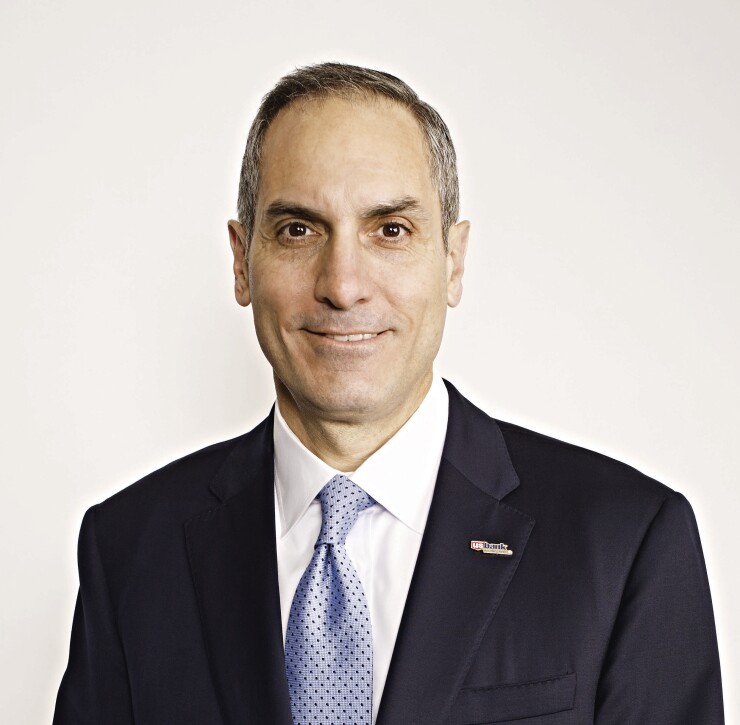Editor's note: This story was adapted from
For the past year U.S. Bancorp CEO Richard Davis has been preparing the industry for his retirement, making clear to analysts and investors that his longtime deputy, Andy Cecere, was the heir apparent.
The plan
While the timing of the announcement was something of a surprise, the choice of Cecere as a successor was all but expected. In a series of recent public appearances, Davis has turned the spotlight on Cecere, introducing him on a public stage and bolstering his image.
"We are telegraphing to you that one day … he would succeed me and run the company," Davis said at the Bernstein Strategic Decisions Conference in New York in June.
Still, there are questions about what exactly makes Cecere, 56, a good fit in today's world — and how the low-profile executive will fashion a public image in the months ahead.
The transition at U.S. Bancorp is important not only because it involves the leadership of the fifth-largest banking company in the country. It also will be watched closely because many banks, including JPMorgan Chase and BB&T, have prominent, long-serving CEOs, and the next generation of leaders will have long shadows to step out from and new business challenges to overcome.

Reputations will likely be won or lost on how well bankers generate growth in a sluggish economy and adapt to a high-tech world, observers said.
Cecere, for one, "will have to contend with this slower pace of macroeconomic growth," said Scott Siefers, an analyst with Sandler O'Neill.
Finding new ways to grow may be the "defining issue" for the industry's next generation of big-bank CEOs, said Gerard du Toit, head of banking and financial services in the Americas at Bain & Co.
Challenges Ahead
Davis, 58, took over as CEO in 2006. He secured his legacy in banking by steering the company through the financial crisis and making big investments that burnished its image in the aftermath.
But profits at U.S. Bancorp have been flat recently,
During a presentation to investors this fall, U.S. Bancorp lowered a handful of long-term profitability targets — including its three-year goal for return on equity — citing predictions for a flat yield curve. Since the November elections, however, the outlook for the industry as a whole has improved, due in part to expectations for a lighter touch on regulations and lower taxes under President-elect Donald Trump and expectations of further Federal Reserve rate increases.
Meanwhile, the $454 billion-asset company — a giant among regionals, yet significantly smaller than the megabanks — has made innovation a priority, announcing big investments in areas such as faster payments and robo-advisory platforms.
One possible area of growth is acquisitions. While the company is currently prohibited from buying banks under
Davis has said several times he would love to do more traditional bank M&A. U.S. Bancorp was also notably floated as a potential acquirer of the $71 billion-asset Comerica in Dallas, which had reportedly been exploring a sale.
Credentials, Contrasts
Several people familiar with Cecere's leadership style say his credentials alone speak to why he was groomed to take over.
He currently oversees all major business lines, including consumer banking, payments and wealth management.
He has held a long list of executive roles in his three-decade career with the company, including chief financial officer and head of wealth management. He also represents the company on corporate boards and civic organizations.
"He's got the intellect," said John Wiehoff, chief executive of C.H. Robinson, a supply chain management firm in the Twin Cities, who serves with Cecere on a separate corporate board.
Cecere's temperament, however, would be a notable shift from the bravado that's expected from a big-bank CEO.
He has a reputation as a good listener who speaks only when he has something to say. Most describe him as low-key and reserved.
For instance, in accepting a recent alumni award from the Carlson School of Management in Minnesota, he declined to mark the occasion with a customary party and celebratory speech.
Instead, Cecere — who is on the school's board of overseers — requested a small lunch, to which he invited his wife and mother, according to Sri Zaheer, dean of the Carlson School.
"He's not really flamboyant," Wiehoff said.
If there are any drawbacks to choosing Cecere, it's that he is not yet a household name.
At all companies, a new CEO can take some getting used to. At U.S. Bancorp, it could take even longer, given Davis' strong reputation.
"This is the classic leadership transition," said Michael DeVaughn, a management professor at the University of St. Thomas in St. Paul. "What happens when you transition from a strong charismatic leader to the No. 2 person?"
Davis is known locally as a civic-minded leader who helped finance a popular professional football stadium.
In the industry, of course, he is known for his colorful commentary on economic trends. He once dropped a "Star Trek" reference in a talk about cybersecurity without missing a beat.
"That will be a challenge that bleeds into leadership," DeVaughn said. "How will [Cecere] step out?"
DeVaughn drew broad comparisons to the somewhat rocky CEO transition at Apple, when Tim Cook, a previously unknown insider, succeeded founder Steve Jobs.
Whether Cecere may diverge from Davis on strategy won't become clear until he begins to call the shots.
Still, at a time when banks are struggling to maintain their reputations, having someone with Cecere's temperament and skill set could be an asset, DeVaughn said.
In the coming months and years, the industry will be watching to see how Cecere handles the limelight - and if he embraces his role on the public stage.
"Like it or not, at a company of that size, the CEO is always in the spotlight," Siefers said. "There are really only a couple of large banks that are that highly regarded."





